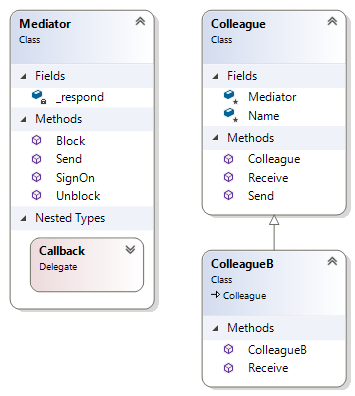Mediator Pattern
Description:
» The Mediator pattern enables objects to communicate without knowing each other's identities;» The Mediator pattern is used in many modern systems that reflect a send/receive protocol;
» The Mediator pattern can have a performance impact on a system because all communication must go through the mediator and it can become a bottleneck.
Use When:
» Objects communicate in well-structured but potentially complex ways;» The objects identities should be protected even though they communicate;
» Some object behaviours can be grouped and customized.
// Define the Mediator Object.
//Define the Mediator class (object) which is responsible for managing messages that are exchanged between colleagues.
//Callback methods are used to invoke the Receive() method on the relevant Colleagues classes (objects).
public class Mediator
{
public delegate void Callback(string message, string from);
private Callback _respond;
public void SignOn(Callback method)
{
_respond += method;
}
public void Block(Callback method)
{
_respond -= method;
}
public void Unblock(Callback method)
{
_respond += method;
}
public void Send(string message, string from)
{
_respond(message, from);
Console.WriteLine();
}
}
//Define the Mediator class (object) which is responsible for managing messages that are exchanged between colleagues.
//Callback methods are used to invoke the Receive() method on the relevant Colleagues classes (objects).
public class Mediator
{
public delegate void Callback(string message, string from);
private Callback _respond;
public void SignOn(Callback method)
{
_respond += method;
}
public void Block(Callback method)
{
_respond -= method;
}
public void Unblock(Callback method)
{
_respond += method;
}
public void Send(string message, string from)
{
_respond(message, from);
Console.WriteLine();
}
}

//Define the Colleague Objects.
//The Colleague class (object) represents the person who either sends or receives messages through the mediator.
//Each instance of the Colleague class (object) will register itself with the Mediator class (object) using the SignOn() method.
//Messages will be send by invoking the Send() method on the Mediator class (object).
public class Colleague
{
protected Mediator Mediator;
protected string Name;
public Colleague(Mediator mediator, string name)
{
Mediator = mediator;
mediator.SignOn(Receive);
Name = name;
}
public virtual void Receive(string message, string from)
{
if (!string.Equals(from, Name))
{
Console.WriteLine("Colleague {0} received from {1}: {2}", Name, from, message);
}
}
public void Send(string message)
{
Console.WriteLine("Colleague Send (From {0}): {1}", Name, message);
Mediator.Send(message, Name);
}
}
//The ColleagueB class (object) is essentially another version of the Colleague class (object) and represents the person who either sends or receives messages through the mediator.
public class ColleagueB : Colleague
{
public ColleagueB(Mediator mediator, string name) : base(mediator, name)
{
}
public override void Receive(string message, string from)
{
if (!string.Equals(from, Name))
{
Console.WriteLine("ColleagueB {0} received from {1}: {2}", Name, from, message);
}
}
}
//The Colleague class (object) represents the person who either sends or receives messages through the mediator.
//Each instance of the Colleague class (object) will register itself with the Mediator class (object) using the SignOn() method.
//Messages will be send by invoking the Send() method on the Mediator class (object).
public class Colleague
{
protected Mediator Mediator;
protected string Name;
public Colleague(Mediator mediator, string name)
{
Mediator = mediator;
mediator.SignOn(Receive);
Name = name;
}
public virtual void Receive(string message, string from)
{
if (!string.Equals(from, Name))
{
Console.WriteLine("Colleague {0} received from {1}: {2}", Name, from, message);
}
}
public void Send(string message)
{
Console.WriteLine("Colleague Send (From {0}): {1}", Name, message);
Mediator.Send(message, Name);
}
}
//The ColleagueB class (object) is essentially another version of the Colleague class (object) and represents the person who either sends or receives messages through the mediator.
public class ColleagueB : Colleague
{
public ColleagueB(Mediator mediator, string name) : base(mediator, name)
{
}
public override void Receive(string message, string from)
{
if (!string.Equals(from, Name))
{
Console.WriteLine("ColleagueB {0} received from {1}: {2}", Name, from, message);
}
}
}